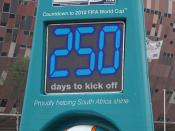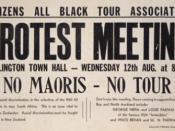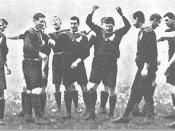New Zealand's sporting activities have often had an impact on international relations and have often divided the country in two. A prime example of this is the apartheid issue with South Africa. This was seen when all the tours took place during the middle 1900's where no "Blacks" were allowed to play when the All blacks toured South Africa. New Zealand finally took action to this racism in the 1981 tour with South Africa, where New Zealand was virtually split in two!
New Zealand's first rugby game against South Africa occurred in 1928 and only white All Blacks were allowed to tour because of the apartheid policy of South Africa. Many tours took place after and it was not until the 1950's that New Zealander's realised how racist this act was. In 1958 the N.Z.R.F.U began organizing a tour for the South African's for 1960, and for the first time New Zealander's were on the streets to protest.
Despite this the tour went ahead.
The protester's used the slogan "NO MAORI'S. NO TOUR!" John Graham the captain of the All Blacks at the time and was one of the many New Zealanders that felt that sports should have nothing to do with politics and apartheid. The event that changed John's mind was the Sharpville Massacre which occurred during the tour where black children held a harmless protest because of the poor state of their schools and education. The police saw them and when the children reached the police station the police opened fire on them killing 150 innocent children. This act was condemned internationally!
After that incident most New Zealander's thought that playing Rugby with them was just supporting them. However the government said that playing rugby with South Africa helps them build bridges with them as well as...


